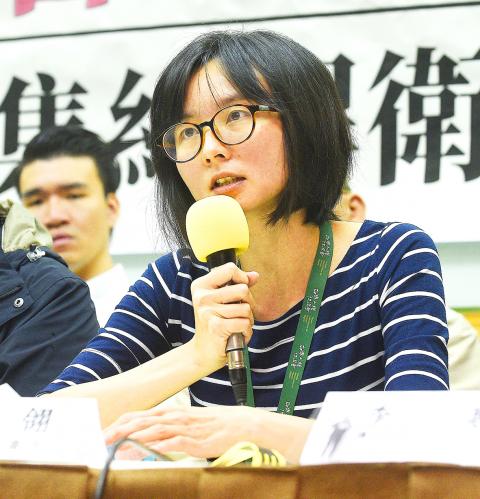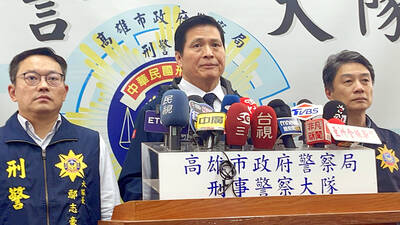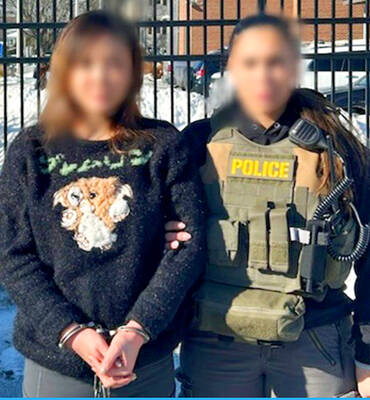Academics and civil groups have voiced concern over an offer by China’s Supreme People’s Court last week to extend certain judicial services to Taiwanese, citing China’s poor human rights records.
The court listed 36 measures that officials said would “benefit Taiwanese” and “promote cross-strait integration,” ranging from allowing Taiwanese to use their Chinese residency card for identification in lawsuits before the Supreme Court, letting them apply for legal assistance, audit trials and meet with their guardian, or relatives after being indicted, unless doing so would undermine their trail, to possibly hiring Taiwanese as court clerks and promoting court internship programs for Taiwanese.
A service for Taiwanese detained in China would inform their family of their situation within 24 hours of their detention, the court said.

Photo: Chen Chih-chu, Taipei Times
By offering an increasing number of benefits to its residency cardholders, the Chinese government is apparently attempting to “domesticize Taiwanese affairs” and turn the residency cards into a national identification card, said Hu Po-yen (胡博硯), an associate law professor at Soochow University.
The new measures would only apply to the Supreme Court, which means Chinese prosecutors, police and security authorities could still arrest and detain Taiwanese without informing anyone, he added.
China’s judiciary does not have the same judicial independence and awareness in human rights as many other countries do, and has little credibility, he said.
“The 36 measures sound nice, but whether they would be followed through is another question,” he said.
There have been plenty of cases where Chinese authorities handled judicial cases arbitrarily and unfairly for a variety of reasons, citing the detention and conviction of Taiwanese human rights advocate Lee Ming-che (李明哲) and telecom fraud suspects, Taiwan Association for Human Rights secretary-general Chiu Ee-ling (邱伊翎) said.
In most cases, Taiwanese families cannot even find out where a relative is being held and the progress of their trial, she said.
Chinese authorities can do whatever they want to Taiwanese, as “human rights are never guaranteed there and the so-called benefits are not real,” she said.
The Mainland Affairs Council said it would be illegal for a Taiwanese to work as a court clerk in China, as clerks are civil servants and the government has, since 2004, banned Taiwanese from working as civil servants in China.
If a Taiwanese accepted such a post, they would be asked to offer an explanation and the council would review related evidence with other government agencies, it said.
Under the Cross-Strait Joint Crime-Fighting and Judicial Mutual Assistance Agreement (海峽兩岸共同打擊犯罪及司法互助協議) and other pacts, China is supposed to notify Taiwan when a Taiwanese is detained in China and allow family visits.
Additional reporting by staff writer

Twenty-four Republican members of the US House of Representatives yesterday introduced a concurrent resolution calling on the US government to abolish the “one China” policy and restore formal diplomatic relations with Taiwan. Led by US representatives Tom Tiffany and Scott Perry, the resolution calls for not only re-establishing formal relations, but also urges the US Trade Representative to negotiate a free-trade agreement (FTA) with Taiwan and for US officials to advocate for Taiwan’s full membership in the UN and other international organizations. In a news release announcing the resolution, Tiffany, who represents a Wisconsin district, called the “one China” policy “outdated, counterproductive

Actress Barbie Hsu (徐熙媛) has “returned home” to Taiwan, and there are no plans to hold a funeral for the TV star who died in Japan from influenza- induced pneumonia, her family said in a statement Wednesday night. The statement was released after local media outlets reported that Barbie Hsu’s ashes were brought back Taiwan on board a private jet, which arrived at Taipei Songshan Airport around 3 p.m. on Wednesday. To the reporters waiting at the airport, the statement issued by the family read “[we] appreciate friends working in the media for waiting in the cold weather.” “She has safely returned home.

ON PAROLE: The 73-year-old suspect has a criminal record of rape committed when he was serving in the military, as well as robbery and theft, police said The Kaohsiung District Court yesterday approved the detention of a 73-year-old man for allegedly murdering three women. The suspect, surnamed Chang (張), was arrested on Wednesday evening in connection with the death of a 71-year-old woman surnamed Chao (趙). The Kaohsiung City Police Department yesterday also unveiled the identities of two other possible victims in the serial killing case, a 75-year-old woman surnamed Huang (黃), the suspect’s sister-in-law, and a 75-year-old woman surnamed Chang (張), who is not related to the suspect. The case came to light when Chao disappeared after taking the suspect back to his residence on Sunday. Police, upon reviewing CCTV

Johanne Liou (劉喬安), a Taiwanese woman who shot to unwanted fame during the Sunflower movement protests in 2014, was arrested in Boston last month amid US President Donald Trump’s crackdown on illegal immigrants, the Criminal Investigation Bureau (CIB) said yesterday. The arrest of Liou was first made public on the official Web site of US Immigration and Customs Enforcement (ICE) on Tuesday. ICE said Liou was apprehended for overstaying her visa. The Boston Field Office’s Enforcement and Removal Operations (ERO) had arrested Liou, a “fugitive, criminal alien wanted for embezzlement, fraud and drug crimes in Taiwan,” ICE said. Liou was taken into custody